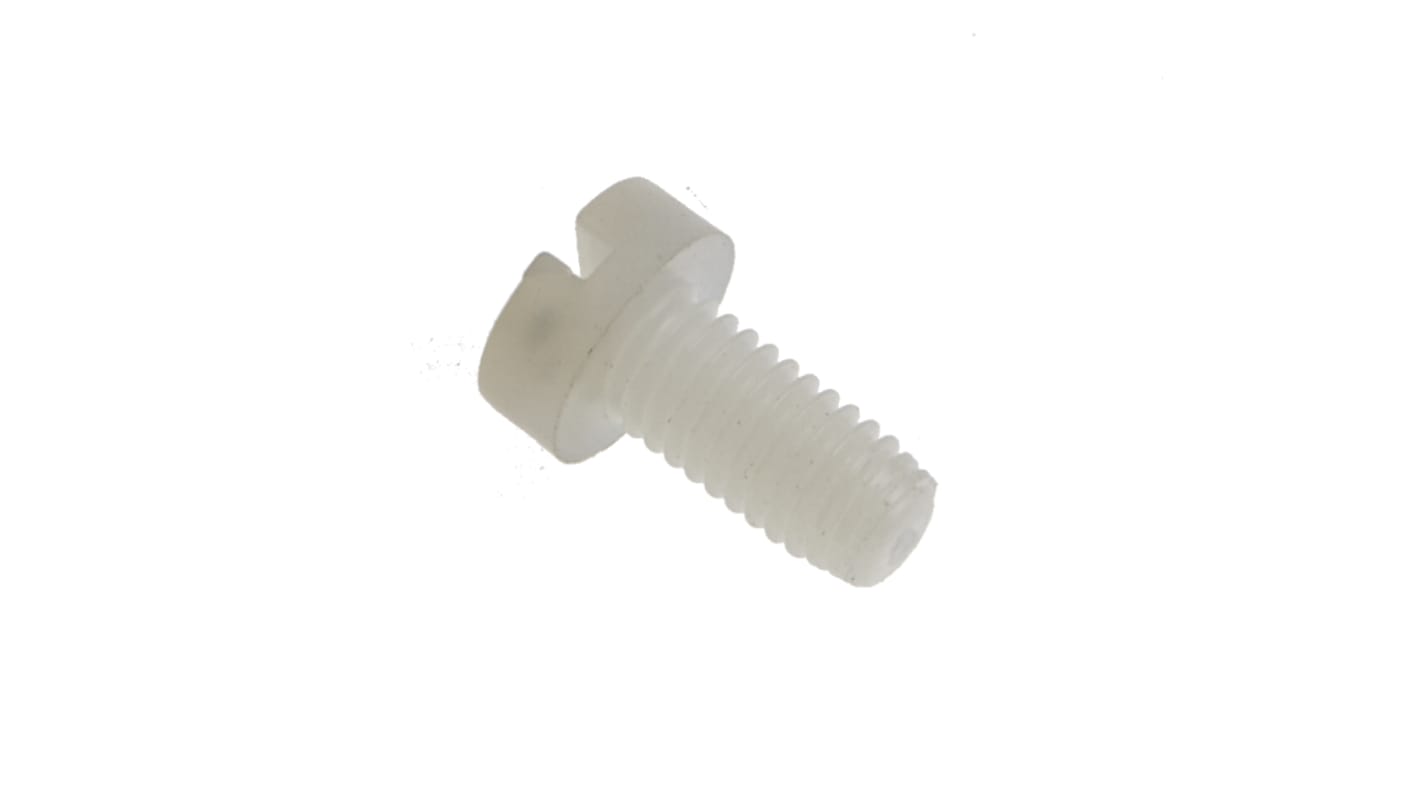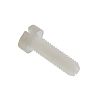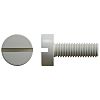RS PRO Slot Cheese Head Nylon Machine Screws, M5x12mm
- RS庫存編號:
- 527-735
- 製造商:
- RS PRO
此產品已停售
替代產品
該產品我們目前不提供。 這些是我們推薦的替代產品。
毎包:100 个
HK$120.75
毎包:100 个
HK$244.76
- RS庫存編號:
- 527-735
- 製造商:
- RS PRO
Slotted Cheese Head Machine Screws, Metric Thread - Nylon 6.6
From RS Pro, a range of superior quality cheese head machine screws with a metric thread. The fully threaded fixings have a slotted drive type allowing for easy tightening with a flat blade screw driver. Moulded from ivory coloured Nylon 6.6 these machine screws are ideal for applications that require high mechanical strength and excellent corrosion and insulation resistance. The machine screws can be mated with pre-tapped holes or through hole when used with threaded nylon nuts. RS Pro Nylon 6.6 machine screws are available in an array of lengths and thread sizes to accommodate most applications.
Features and Benefits
• Tough and lightweight
• Abrasion and vibration resistant
• Good electrical and thermal insulating properties
• Suitable for use in high-voltage assemblies
• Non-magnetic
• No electromagnetic interference
• Abrasion and vibration resistant
• Good electrical and thermal insulating properties
• Suitable for use in high-voltage assemblies
• Non-magnetic
• No electromagnetic interference
What is a Machine Screw?
A machine screw is similar to a bolt but has a socket or a slot in its head that allows it to be turned by a screwdriver. The shank on a machine screw is straight rather than tapered with a full thread which is uniform along the entire length. Machine screws do not tap their own thread into materials like wood screws do but are designed to be fastened into pre-tapped holes in the parts they are fastening together. Having a threaded hole creates a stronger joint and results in a higher quality product.
Where are they used?
A cheese head type screw literally has a head that looks like a wheel of cheese!. The screw head has a raised cylindrical shape with a flat surface. The design of this screw head type enables the slot to be deeper for increased driving power when used with a flat bladed screwdriver
Features and Benefits of Nylon Screws
Electronics
Circuit boards
Household appliances
Commercial machinery
Automotive parts
Circuit boards
Household appliances
Commercial machinery
Automotive parts
Why use Nylon screws?
Machine screws are designed to hold separate components together in a wide range of manufacturing and electronic applications. They are screwed through pre-drilled tapped holes in 2 components and can be fastened at the rear with a nut. Nylon machine screws can be used as fasteners for a wide range of different materials including particle board, metal, wood, rubber and other plastics. Being made of nylon makes these screws ideal for use in devices where weight is a constraint. The excellent electrical insulation properties of nylon also make these machine screws ideal for use in electronics design. Applications include the following:
• Washing machines
• Household appliances
• Handheld devices
• Electronics and circuit boards
• Commercial machinery
• Automotive parts
• Household appliances
• Handheld devices
• Electronics and circuit boards
• Commercial machinery
• Automotive parts
Nylon screws are, as they are describe, made from Nylon. They come in many different shapes and sizes, with various drive types.
Nylon screws are popular for applications which require the properties of Nylon, for example: lightweight, corrosion resistance, rust resistance and electrical insulation.
Nylon screws are popular for applications which require the properties of Nylon, for example: lightweight, corrosion resistance, rust resistance and electrical insulation.
Frequently Asked Questions
What Does M2.5, M3, M3.5, M4, M5 Mean?
Other Available Sizes:
(527-656) M3 x 0.50 - 20 mm
(527-684) M4 x 0.70 - 12 mm
(527-690) M4 x 0.70 - 16 mm
(527-707) M4 x 0.70 - 20 mm
(527-735) M5 x 0.80 - 12 mm
(527-779) M6 x 1.00 - 12 mm
(527-785) M6 x 1.00 - 16 mm
(527-791) M6 x 1.00 - 20 mm
(527-808) M6 x 1.00 - 25 mm
(527-814) M6 x 1.00 - 30 mm
(527-971) M3 x 0.50 - 6 mm
(527-987) M3 x 0.50 - 12 mm
(527-993) M3 x 0.50 - 16 mm
(527-656) M3 x 0.50 - 20 mm
(527-684) M4 x 0.70 - 12 mm
(527-690) M4 x 0.70 - 16 mm
(527-707) M4 x 0.70 - 20 mm
(527-735) M5 x 0.80 - 12 mm
(527-779) M6 x 1.00 - 12 mm
(527-785) M6 x 1.00 - 16 mm
(527-791) M6 x 1.00 - 20 mm
(527-808) M6 x 1.00 - 25 mm
(527-814) M6 x 1.00 - 30 mm
(527-971) M3 x 0.50 - 6 mm
(527-987) M3 x 0.50 - 12 mm
(527-993) M3 x 0.50 - 16 mm
These measurements are found on metric screws, The 'M' stands for Metric. The number after the 'M' is the nominal outer diameter of the screw in mm.
How Do I Cut a Machine Screw?
Damage to the machine screw threads can prevent parts from fitting together properly, therefore care has to be taken when cutting them and the correct tools used.
Cutting a small machine screw (up to standard size #10 or metric size M5 (5mm)
Use a pair of multipurpose wire strippers or electricians pliers that feature M2.5, M3, M3.5, M4, M5 threaded holes. These holes are designed for cutting bolts without damaging the thread. Open the jaws and thread the machine screw into the correct size hole to the distance required. Squeeze the tool handles closed and the screw will be cut at the point where the two halves of the jaws come together. You will have a clean cut without any thread damage.
Cutting a large machine screw (larger than size #10 or metric size M5 (5mm)
This is best done using a hacksaw. Thread the nut on the screw until it reaches the desired point on the head side of the cutting line. Place the screw in a vice or clamp to keep it secure when cutting and cut the screw as straight as you can. When you unthread the nut it will repair and realign any threads that may have been damaged by the saw blade
Use a pair of multipurpose wire strippers or electricians pliers that feature M2.5, M3, M3.5, M4, M5 threaded holes. These holes are designed for cutting bolts without damaging the thread. Open the jaws and thread the machine screw into the correct size hole to the distance required. Squeeze the tool handles closed and the screw will be cut at the point where the two halves of the jaws come together. You will have a clean cut without any thread damage.
Cutting a large machine screw (larger than size #10 or metric size M5 (5mm)
This is best done using a hacksaw. Thread the nut on the screw until it reaches the desired point on the head side of the cutting line. Place the screw in a vice or clamp to keep it secure when cutting and cut the screw as straight as you can. When you unthread the nut it will repair and realign any threads that may have been damaged by the saw blade
Note
Please note IMDS is not a regulatory requirement and is currently not supported by RS PRO
Attribute | Value |
|---|---|
| Head Shape | Cheese |
| Drive Type | Slot |
| Length Metric | 12mm |
| Thread Size Metric | M5 |
| Material | Nylon |
| Finish | Plain |
| Thread Pitch | 0.8mm |



